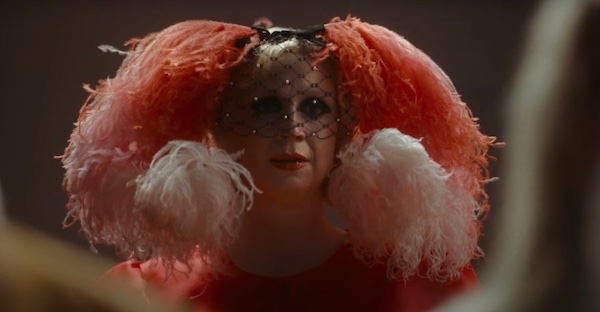Film Review: “Flux Gourmet” — Food, Glorious Food
By Peg Aloi
Flux Gourmet occasionally reminded me of the films of Peter Greenaway, who often juxtaposed the grotesque or disturbing with the beautiful and ethereal.
Flux Gourmet directed by Peter Strickland. Streaming on Video on Demand.

A scene from Flux Gourmet.
Peter Strickland’s In Fabric is ostensibly about a dress that causes disturbing events in the life of the woman who purchases and wears it, but it’s more than a story of a haunted garment. At one point we realize that, beneath the world we live in, there’s a subterranean realm that wields control over our free will. The dress is not just a dress: what it represents is part of a dark truth that permeates our lives, our desires, our dreams, and our fears. Strickland is a sly deconstructionist. He is interested in prodding us to look beneath the surface of things, perhaps goading us into admitting we are co-conspirators in what might turn out to be an elaborate pantomime of existence. I’m not sure why, but I find it impossible to watch a Strickland film (such as Berberian Sound Studio and The Duke of Burgundy, movies that also plumb disturbing depths) without resuming an inner dialogue about life, death, truth, and art that is both fretful and fascinating.
In Flux Gourmet, Strickland’s most recent effort, a collective of sound artists are invited to develop their art in residency at a posh retreat in the countryside. At first glance, the place appears to be bucolic and, though small, luxurious. But there’s something odd about the setup. The rooms feel more dimly lit than they should be, and there’s no clear sense of temporal specificity. It might be the ’60s, or right now. The place is known as the Sonic Catering Institute, and its overseer, the elegant and eccentrically attired Jan Stevens (the excellent Gwendoline Christie, seen recently in Sandman), seems passionately devoted to the artistic mission: the support and nurturing of artists who perform in a rather niche realm. The collective is still trying to decide on its name. The trio consists of two sound artists, who use electronics, instruments, and food (the sounds of cooking, eating, and digestion are at the center of their creativity), and one performer, Elle di Elle (Fatma Mohamed, who had a small but beguiling role in In Fabric). Her main instrument is her body, and she is the de facto impresario and front woman for the group. A power dynamic is present from the beginning. Elle is insistent that her artistic vision must dominate the performances, despite the fact that Billy (Sex Education’s Asa Butterfield) and Lamina (Greek-French actress Ariane Labed) are contributing the bulk of the artistic output, and demonstrate impressive skill and talent.

Gwendoline Christie as Jan Stevens in Flux Gourmet.
The performances are fascinating, part riffs on ’90s-style performance art, part bizarre bespoke invention. The spectacles will probably rattle the five senses of observers who are not used to seeing food preparation contextualized as art, much less entertainment. There is very little focus on eating, on food as something to enjoy: taste is the one sense that is subjugated to the others. But in this film “sonic catering” is seen as an artistic discipline, worthy of study and exploration. The seriousness eventually becomes rather compelling, even though it sometimes comes off as absurd. As the residency continues, tension festers. Billy and Lamina are too meek or wary of confrontation to challenge Elle’s increasingly reckless narcissism. Growing rivalries and resentments force the collective to define themselves, or at least admit their shortcomings. Jan’s involvement with the collective crosses a line; her increasingly outrageous outfits seem to expose the yearnings of a frustrated artist (those who can’t, administrate). Yet her elaborate couture is also a stand-in for the sorts of characters that seem curiously absent here: the voluptuary and the hedonist. In creating this oddball artistic framework, Strickland is not only satirizing the art world; he is reinventing food as living art, materials that must be immediately consumed before they begin to rot. Adding to the intrigue: a journalist (Makis Papadimitriou) who is tasked with recording the proceedings. Unfortunately, his struggles with digestive discomfort threaten to overtake his focus on the art. These embarrassing intestinal troubles become a prominent narrative element; they are a cheeky nod to Strickland’s embrace, via impeccably gorgeous imagery, of taboo subject matter. I can’t recall a film that has so sensuously engaged with food while simultaneously avoiding the portrayal of eating. But the comestibles are from being romanticized here; sometimes they feel vaguely threatening, monstrous ingredients in a body horror movie.
Flux Gourmet occasionally reminded me of the films of Peter Greenaway, who has often juxtaposed the grotesque or disturbing with the beautiful and ethereal. Cinema that grapples with the frailties of the human body is intriguing, and Strickland probes that vulnerability by meditating on notions of permanency and legacy, art and sex, death and decay. Making art is one way that humans think they can achieve immortality, but the film provocatively challenges that notion by drawing connections between consumption and creativity. Art may stand the test of time, but time consumes bodies as we consume food; Flux Gourmet invites us to contemplate the paradox of art’s immediacy and longevity, the conundrum of the body that will not be ignored.
Peg Aloi is a former film critic for the Boston Phoenix and member of the Boston Society of Film Critics. She taught film studies in Boston for over a decade. She writes on film, TV, and culture for web publications like Time, Vice, Polygon, Bustle, Mic, Orlando Weekly, and Bloody Disgusting. Her blog “The Witching Hour” can be found on substack.

Because of your review, we just watched this film and enjoyed it send-up of the arts world referencing back to Fluxus movement of the ’60s. Thank you.